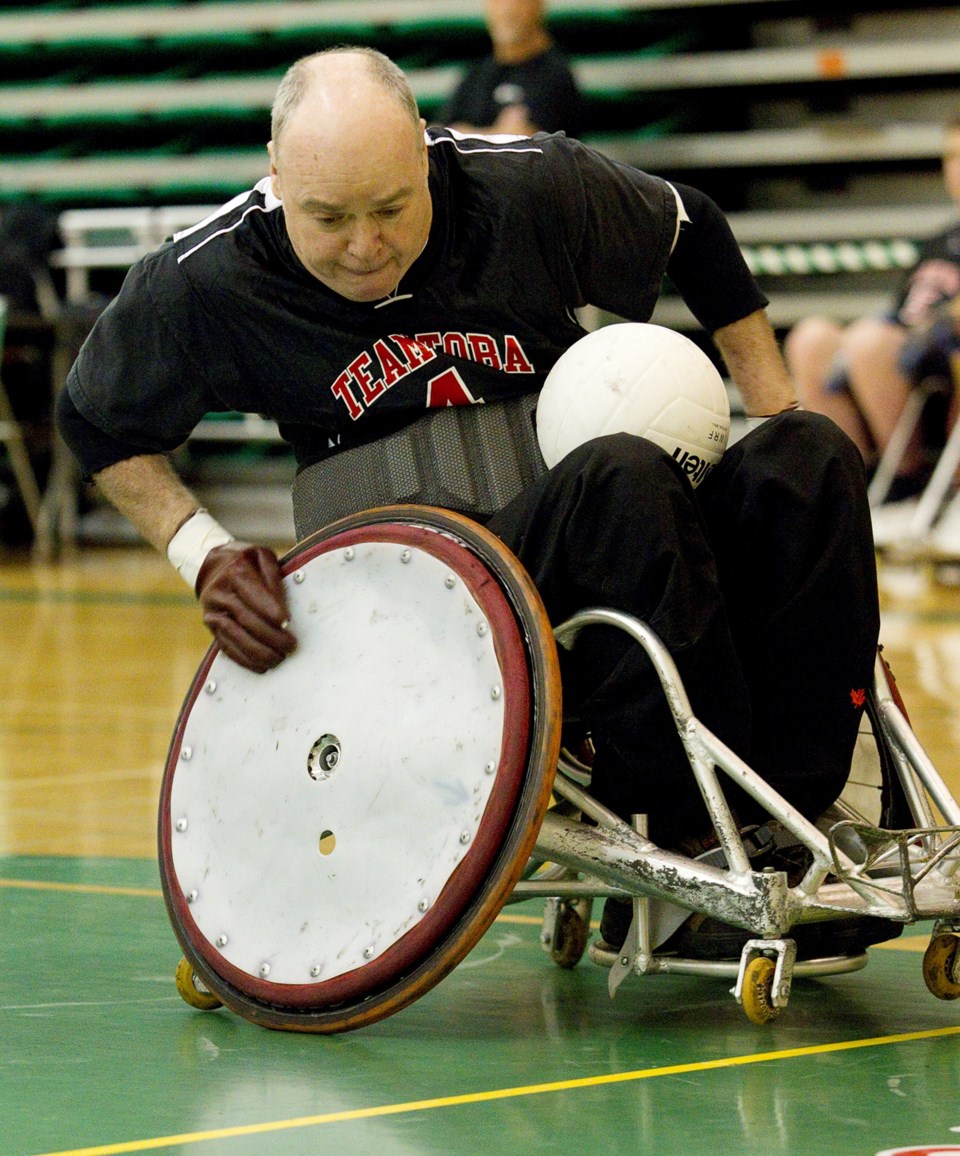And, because it was a film about rugby, albeit rugby played by athletes in wheelchairs, I was of course immediately intrigued since I have come to appreciate rugby in its many shapes and forms.
So, when I saw a post online awhile back that Duncan Campbell was among the 2020-21 inductees into Canada’s Sports Hall of Fame I reached out to a contact to help arrange an interview.
Campbell was one of the creators of wheelchair rugby.
Campbell was inducted in the Builder category for his role in developing the sport of Wheelchair Rugby from its early inception in 1976. Campbell’s involvement has led to the transformation of the sport from its beginnings, originally called ‘Murderball’. The sport has since evolved to become one of most popular Parasports, making its Paralympic Games debut in 1996 as a demonstration sport and achieving full medal status in 2000, notes www.sportshall.ca
Campbell said the induction was gratifying.
“It was pretty cool – very cool,” he said.
Campbell said he takes the induction as something that reflects not only on his accomplishment, but also as something of a validation of the sport itself.
Wheelchair rugby sort of happened by luck, with a bit of design thrown in.
“It came out of four guys fooling around in a gym in Winnipeg,” said Campbell.
Growing up in Winnipeg, Campbell was a typical Canadian youth with a love of sport including hockey, but a diving accident at age 17 left him a quadriplegic. While doctors thought he might never live or work independently again, Campbell remained determined to pursue an active lifestyle and began working out alongside other people with physical disabilities at a local gym in Winnipeg.
While getting back to hockey was impossible Campbell did find his way back to sport.
“One night in 1976, he and four friends—Jerry Terwin, Randy Dueck, Paul LeJeune, and Chris Sargent—showed up for their weekly weightlifting workout at a Winnipeg rehab centre, but the volunteer who assisted them didn’t show up. They went down the hall to the gymnasium instead and began fooling around with a volleyball. Within 45 minutes they had the basic rules to a fast-paced, physical game similar to rugby, but played in wheelchairs on a basketball court. They knew right away they had something and called it ‘murderball’,” detailed bcsportshall.com
Campbell said while not specifically looking to create a rugby-style game the four were looking at what might develop into a team sport for people in wheelchairs.
“What we were thinking was there was no team sport for us to play,” he recalled. “We were trying to come up with a team sport.”
Soon after demonstrating the game to others in Canada, it spread to the US and overseas to Australia, New Zealand, Japan, and Britain.
In Campbell’s words, it “just blew up,” noted the bcsportshall.com – Campbell is an inductee there too. Now the world’s fastest growing wheelchair sport, over fifty nations play wheelchair rugby. Its’ popularity has exploded since becoming a full Paralympic medal sport in 2000 and boosted further by the Academy Award-nominated Murderball.
“It’s the most-watched ... most-attended sport at the Paralympics,” Campbell told this journalist.
In 1995 wheelchair rugby appeared as a demonstration sport at the 1996 Summer Paralympics in Atlanta.
The sport has had full medal status since the 2000 Summer Paralympics in Sydney, Australia.
Asked why the sport has grown so quickly, Campbell has an answer ready.
“I think it’s because it’s fast. It’s got a little bit of violence in it which people like,” he related.
The physical aspect perhaps came naturally to Campbell and the others coming from Canada where hockey is king.
Campbell said the sport also hits a sort of sweet middle when it comes to scoring.
“There’s never enough scoring in hockey and way too much in basketball,” he said, adding wheelchair rugby typically has 40 point scores, a bit higher at the top level of the game.
It helped too there were para-athletes looking for a sport, “especially in the United States,” said Campbell. “When the U.S. takes hold of something it grows.”
Initially, Campbell was a player.
“I was in it to play it,” he said, adding being part of the sport’s development in the early years came out of being an active player.
Campbell was a sort of ‘Johnny Appleseed’ of wheelchair rugby at the start. He moved to Edmonton and found the sport had not yet started there, so he kickstarted things.
A later move to B.C. found the wheelchair rugby organization with some obstacles “things that needed to be done,” he said, so he stepped up and got involved there too. That would lead to an eventual job that lasted nearly a decade and a half working with the sport.
He has participated in every capacity from player to coach to administrator. He also served as a member of the International Wheelchair Rugby Federation, national development director for the Canadian Wheelchair Sports Association, and committee member for the 2010 world wheelchair rugby championships.
In 2001, Canadian players changed the name of the national championship trophy to the Campbell Cup in his honour.
In 2013, Campbell received the prestigious Paralympic Order from Sir Philip Craven, president of the International Paralympic Committee.
So does Campbell have a vision of the sport’s future – a pro league perhaps?
Campbell said a pro league would be great but added “it’s not the end of my world.”
Now retired his vision is a broader base of grassroots wheelchair ruby, with “a team in every city ... people having a blast playing ... a tournament every weekend.”

